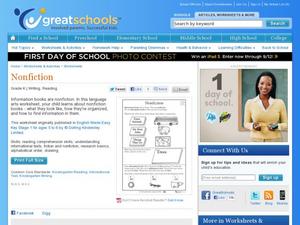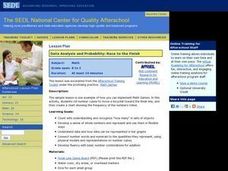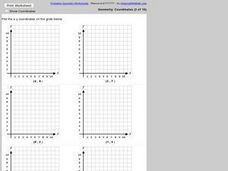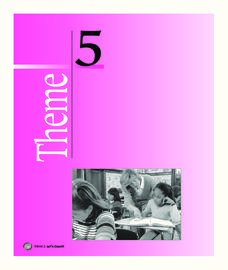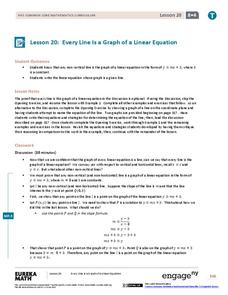Curated OER
Eggs Filled With Sound-Five Senses
Young scholars use their five senses to examine an eggs with objects inside them. They use their hearing to identify the object in the egg and open them to see if their guess was correct. They end the lesson by discussing their sense of...
Curated OER
Finding Captain Hook's Treasure
Students use their map-reading skills to find Captain Hook's treasure. They see how the directions on a map correspond with "real-life" directions, and that symbols on a map represent real things.
Math Worksheets Land
Decimals to Fractions Lesson and Practice
Young mathematicians work through the concept of converting a shaded ten-frame into a mixed number and a decimal. Learners must first identify the number of wholes. Then, they find the fraction part. After writing the...
Curated OER
Kids/Blocks/Learning
Help develop graphing skills in your young learners.. They create a picture graph, represent 1:1 correspondence, represent same and different, and draw conclusions. They write an experience story about the conclusions drawn from the...
Curated OER
Nonfiction
As scholars begin using informational texts, it's important they understand their uses and features. This visual worksheet has readers match three text titles to corresponding pictures. Next, they examine a book cover with the...
Curated OER
Class Number Book
Students practice counting by ones. They find the numbers one through ten in a magazine or catalog. They put their picture into a classbook and they use it to practice counting.
Curated OER
Mended Hearts, Broken Hearts, Healthy Hearts, Half-Hearted
Learners integrate locomotor movements with nutrition information. They solve simple math functions related to the calories-per-gram contents of each nutrient and perform fitness activities to match the number of calories contained in...
Curated OER
Data Analysis and Probability Race to the Finish
Students practice addition facts, record data, and construct a bar graph. In this probability lesson, students participate in a board game in which bicycles move towards a finish line based on players completing addition problems. Dice...
Curated OER
Corresponding Sides and Angles of Similar Triangles
Young scholars differentiate between corresponding sides ad angles of two triangles. In this geometry lesson plan, students identify the differences as well as the similarities between two triangles. They differentiate between similar...
Curated OER
Number Trivia
In this secondary mathematics worksheet, students determine the answer to trivia clues and perform the indicated operation. They then write that answer if the box which correspond to the letter of the clue to form a magic...
Curated OER
The Mysterious Hexagon on Saturn!
In this Saturn worksheet, students use a photograph of a hexagon feature on Saturn to solve three problems. These include finding the time it takes for the jet stream to complete one circuit around the hexagon, to find the size of the...
Curated OER
Homework 7: Hares and Foxes (Based on a problem in Cic)
In this system of equations worksheet, students use systems of equations and Euler's method to calculate the population of hares and foxes. They plot and interpret their results. This one-page worksheet contains three multi-step...
Curated OER
Plotting Coordinates on a Grid
In this plotting points on a graph worksheet, middle schoolers plot 6 points on 6 graphs. Students plot x and y-coordinates in the first quadrant.
Curated OER
Functions and Graphing
Graphing functions in a real world application makes math come to life. Learners graph points on a coordinate plane and identify various points on a graph by working through a set of real world problems. This is a perfect review exercise.
West Contra Costa Unified School District
Parallel Lines Cut by a Transversal
Parallel lines seem so right for each other. It's too bad they'll never, ever meet. Learners use tracing paper to discover relationships among angles formed by two parallel lines cut by a transversal. They apply this information to find...
Florida Center for Reading Research
Phonics: Encoding and Decoding, A Digraph A Word
Learners view a series of images, then choose digraphs, consonants, and vowels to spell out the object's name on each card.
Virginia Department of Education
Congruent Triangles
Is this enough to show the two triangles are congruent? Small groups work through different combinations of constructing triangles from congruent parts to determine which combinations create only congruent triangles. Participants use the...
Curated OER
Connect the Rhymes
As your pre-readers begin to understand phonemes and rhyming, give them this practice worksheet which has them matching rhyming pictures. For each of six images, they identify the corresponding image which has the same vowel sound (or...
Resources for Early Childhood
Making Math Meaningful and Enjoyable
Your young learners will enjoy mathematics that is meaningful correspondence as they play their way to a deep mathematical foundation. Organized around the math standards, this appropriate sequence of conceptual, preschool...
Learning to Give
Your Place in the Community
Learners identify their beliefs and values and compare how these values relate to those of their community. They then determine how their values affect the roles they play in different situations. A quiz about values and beliefs...
Smithsonian Institution
Solomon G. Brown: Letter Writing
Personal correspondence in the form of letters is not as common as it once was. This resource presents an opportunity for you to introduce your class to letter writing and cover topics in social studies. Learners read a letter written in...
Houghton Mifflin Harcourt
Let’s Count!: English Language Development Lessons (Theme 5)
Counting is the theme of this compilation of ESL lessons. Through listening, speaking, and moving, your young learners take part in a variety of activities to enhance their English proficiency such as making menus and books,...
Curated OER
Phonics Instruction: Writing Simple Words
Sound it out, read it, then sound it out, and write it. Little ones work as a class to sound out simple words. After they have sounded out each word they will write that word on the white board. This is a great way to build a connection...
EngageNY
Every Line is a Graph of a Linear Equation
Challenge the class to determine the equation of a line. The 21st part in a 33-part series begins with a proof that every line is a graph of a linear equation. Pupils use that information to find the slope-intercept form of the...






